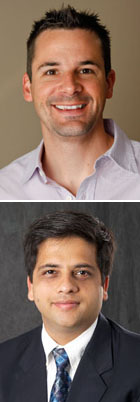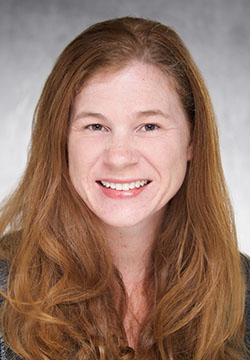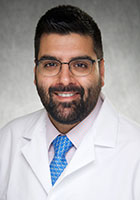Earlier this week, Internal Medicine celebrated its 54th annual Research Day. For more than five decades we have paused one day a year to recognize many of our very talented colleagues who contribute to the advancement of knowledge. Our investigative scope spans a wide swath of academic medicine from health services research, health economics, clinical research and trials, and fundamental bench research. Our faculty’s work touches many disciplines in the life and applied sciences to weave a tapestry that elegantly reveals our diverse research output. I am always impressed to see the number of collaborations with other disciplines, both within our institution and with others around the world.
This year’s Research Day directors are finishing their two-year run of responsibility for the event, and I would like to thank Drs. Ryan Boudreau and Saket Girotra, both from Cardiovascular Medicine, for their tremendous effort and service. Your thoughtfulness and diligence over the past two years have set a very high bar. Not only did you put your unique stamp on the event, but you rapidly pivoted, given the constraints of gathering in person during the COVID-19 pandemic, to put together an amazing activity spread over two days that involved active participation from an impressive number of trainees and faculty. One benefit of a virtual event this year is that a majority of the lectures and talks were recorded and will be made available soon for any who were unable to attend live. Ryan and Saket were assisted by a thoughtful and dedicated administrative team, working behind the scenes, devising new ways of connecting us all virtually. And even scrambling as quickly as possible to restore connectivity when Zoom had its own ideas during the latter half of Day 2. My thanks to you all for a wonderful celebration of one of our core missions.
With this focus on our department’s sizable research footprint, I wanted to highlight an important output of our research activity, the publication. As Dr. Brahmajee K. Nallamothu made clear in his keynote address on Tuesday, the field of academic publishing has a number of flaws, not least of which is its privileging of successful research outcomes. Most of us know that an experiment’s negative results can be just as illuminating to us and to others as positive ones. Nevertheless, and with an understanding that change can come, we still have a responsibility to communicate what we discover to our peers, to document the paths we tread so others can follow. In this respect, our department has blazed a trail. This is evidenced in part on a recent initiative from the Carver College of Medicine to recognize researchers who have h-index scores of at least 50 or higher or of at least 100. To earn this score, one must have at least 50 or 100 publications that have each been cited at least 50 or 100 times. Of the nearly four dozen newly named Impact Scholars in the college, more than a quarter are members of Internal Medicine. One of the three at the “Gold” (or h > 100) level is our own Dr. Mike Welsh, who just earlier this week received further and well-deserved recognition of his impact when he was selected as a finalist for the Sanford Lorraine Cross Award for his discoveries in treatments “with the most promising transformative potential” for people with cystic fibrosis. We all look forward to Sanford Health’s announcement in early December.
In the meantime, I would like to celebrate just a few publications that demonstrate areas where our department is strongest, representing a small sampling of the >1000 publications that our faculty and trainees have published in the past 12 months. Focusing only on the last 6 months, we pulled a list of nearly 20 primary research publications with senior or first authors from the department that have appeared in journals with impact factors greater than 10. I also include two high-impact published case reports from our trainees. Readers can judge for themselves the quality of the work at each of these links, but I will note some of what I believe makes these pieces indicative of who we are.
Carter, Calvin, et al.
“Exposure to Static Magnetic and Electric Fields Treats Type 2 Diabetes”
This ground-breaking work in diabetes treatment has been covered extensively, speaking of “transformative potential.” I am excited to see what Dr. Carter does next.
Nayak, Manasa, et al.
“Metabolic enzyme pyruvate kinase M2 regulates platelet function and arterial thrombosis“
This is the second publication in Blood to come from work done in the lab of Dr. Anil Chauhan. Their team is one of the most consistently productive of high-impact work in the college.
Dodd, Rebecca, et al.
“Tumor subtype determines therapeutic response to chimeric polypeptide nanoparticle-based chemotherapy in Pten-deleted mouse models of sarcoma”
Dr. Dodd has made novel use of CRISPR gene editing in her efforts to find effective therapeutics for malignant peripheral nerve sheath tumors, an aggressive sarcoma.
Girotra, Saket, et al.
“Evaluation of Risk-Adjusted Home Time After Acute Myocardial Infarction as a Novel Hospital-Level Performance Metric for Medicare Beneficiaries”
One area our department has long been internationally known for is cardiovascular medicine, with health care outcomes research being one area in which we are rapidly gaining prominence. Dr. Girotra excels in the overlap of these two fields.
Sangha, Sameet, et al.
“A patient with back pain and morning stiffness”
A case report in JAMA is always special, but even more so for our recent rheumatology fellow graduate, Dr. Sameet Sangha, who is first author on this publication under the tutelage of Dr. Bharat Kumar. The Division of Immunology, as a matter of fact, regularly coaches both residents and fellows to notable publications.
Feng, Alick, et al.
“Recurrent Isolated Hyperbilirubinemia from Drug-induced Impaired Hepatic Bilirubin Uptake“
Another instance here of a junior faculty member and associate fellowship program director offering a trainee hands-on experience with the ins and outs of a publication. In this case, third-year resident Dr. Alick Feng was mentored by Dr. Arvind Murali.
Sivitz, William, et al.
“Optimization of Metformin in the GRADE Cohort: Effect on Glycemia and Body Weight”
Dr. Sivitz has led the University of Iowa’s contribution to this nationwide decades-long study designed to elucidate the most optimal initial combination of oral therapies for type 2 diabetes.
Xie, Yuliang, et al.
“Acidic Submucosal Gland pH and Elevated Protein Concentration Produce Abnormal Cystic Fibrosis Mucus”
Fitting that a publication in Developmental Cell from Dr. Welsh’s lung biology research group closes out this list. No accounting of the breakthroughs in Internal Medicine would be complete without recognizing what Dr. Welsh has inspired his teams over the years to achieve in our understanding of cystic fibrosis.








